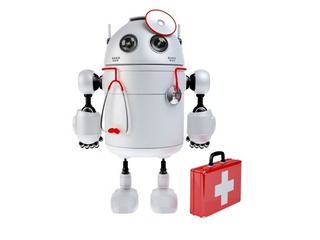Global AI in healthcare market expected to rise to $164B by 2030
The market size for 2023 was $10.31 billion
Read more... The global market for artificial intelligence is expected to grow nearly 10x in just the next few years, from $4.9 billion in 2020 to $45.2 billion by 2026, as every aspect of the space, from the front end to the back end, is transformed by this technology.
The global market for artificial intelligence is expected to grow nearly 10x in just the next few years, from $4.9 billion in 2020 to $45.2 billion by 2026, as every aspect of the space, from the front end to the back end, is transformed by this technology.
Aidoc is focusing on one small part: medical imaging, specifically by using deep learning algorithms to analyze CT images of the head, chest, spine and abdomen, allowing radiologists to better detect abnormalities.
The solution has caught the attention of investors, as the company announced on Wednesday that it raised an additional $20 million as part of its Series B extension round; this follows the $27 million it raised in April of last year from Square Peg Capital, and it brings the total amount of funding raised by the company to $60 million to date.
Founded in 2016, the Tel Aviv-based Aidoc has developed technology, which runs in the background, that is able to flag life-threatening and time sensitive conditions, such as brain hemorrhages or pulmonary embolisms. It then prioritizes those patients so the radiologist knows to look at them first.
The company has six clearances from the FDA to flag conditions that include intracranial hemorrhage, large-vessel occlusion, PE in pulmonary angiography and cervical spine fractures. Earlier this year, it also received permission to use its technology to detect COVID-19 in CT images so that a patient would come in, get a scan, and Aidoc would look to detect what is known as ground-glass opacity (GGO), a type of finding in the lungs that is associated with COVID, as well as viral pneumonia.
Aidoc's technology is currently being used in more than 400 medical centers, including Yale New Haven Hospital, University of Rochester Medical Center, Cedars-Sinai Medical Center and Sheba Medical Center. The company, which saw its revenue triple since the beginning of the year, has been able to reduce turnaround time by 32 percent for critical cases, and has a 96 percent accuracy rate.
The company is planning on using the funding for expansion, both through sales and customer success, Elad Walach, co-founder and CEO of Aidoc, told VatorNews.
"Beyond the expansion to additional sites, we are also going to focus on expanding our product lines. We already have a very comprehensive 'safety net' that covers a large proportion of acute conditions, like brain bleeds, stroke, C-spine fractures, pulmonary nodules, free gas in the abdomen, but we also have an incidental line of products that are unique in their ability to notify on abnormalities that are not expected," he said.
For example, oncology patients go through routine CT scans to follow up on progress of the cancerous growths so a patient with a growth in their lungs would go for a scheduled chest CT that usually is only read a few days, and sometimes even weeks. after the scan is taken.
"This is because the growth isn’t an urgent pathology, so the service level agreement for reading these scans doesn’t require that they be looked at immediately," he said.
"What happens, quite often is that oncology patients experience a 'side effect' that is a pulmonary embolism, a clot in their lungs, and this is a condition that requires immediate attention. What we do, is flag this patient immediately after they get off the scanner which then instigates immediate action from the staff in the screening room and saves this patient’s life. We will be further expanding this line of products to additional pathologies that are incidental."
Updated with comment from Elad Walach.
(Image source: aidoc.com)
The market size for 2023 was $10.31 billion
Read more...At Culture, Religion & Tech, take II in Miami on October 29, 2024
Read more...The company will use the funding to broaden the scope of its AI, including new administrative tasks
Read more...

